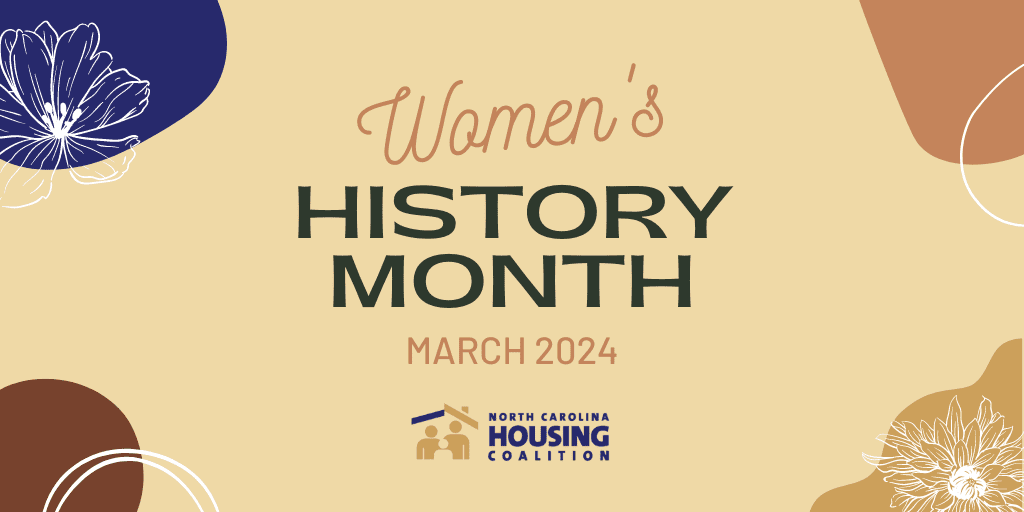
As part of our mission to build a coalition that prioritizes housing advocacy across the state, NCHC works to build relationships with advocates across a variety of sectors. In addition to highlighting partners, we often try to shine a light on local examples of work rooted in social justice and systemic change.
During Women’s History Month, we want to highlight the women that advocate for policies that help women and families to thrive in North Carolina.
As Director of Strategic Partnerships, I work to advance the mission of “housing as a human right”; but I do this work through a lens of racial and gender equity. I’m reminded of two quotes by Melinda Gates:
“As women gain rights, families flourish, and so do societies. That connection is built on a simple truth: Whenever you include a group that’s been excluded, you benefit everyone. And when you’re working globally to include women and girls, who are half of every population, you’re working to benefit all members of every community. Gender equity lifts everyone. Women’s rights and society’s health and wealth rise together.”
“When we invest in women and girls, we are investing in the people who invest in everyone else.”
It is with these ideas that I value what I do at NCHC, as well as my work on the NC Council for Women, which I have served on since 2018. The mission of the Council is “to advocate for and empower women, to amplify the voices of women, and to drive policies that promote education, safety, health, and social and economic justice for the women of North Carolina.” The board is made of 20 members appointed by the Governor and tasked to (1) advise the Governor, the principal State departments, and the State legislature concerning the education and employment of women in the State of North Carolina; and (2) to advise the Secretary of Administration on any matters the Secretary may refer to the Council.
The scope of work done by the Council includes supporting and collaborating with local women’s commissions. Women’s commissions are powerful institutions for ensuring the voices and leadership of women are recognized. Women’s commissions can provide women a platform to raise issues that disproportionately affect women and make lasting change to improve the status of women in their community. Of North Carolina’s 100 counties, there are seven counties/municipalities that have women’s commissions or advisory boards. Expanding the existence of women’s commissions to every county in North Carolina could greatly impact the status of women in North Carolina. According to the Status of Women in North Carolina: Political Participation (2020) report, expanding women’s commissions throughout the state helps magnify the voices of women in government, increases the fundraising power of women, and increases the voices of women at the decision-making table.
In 1974, there was a statewide push for local women’s councils in North Carolina. The purpose of county-level women’s commissions “is to serve as a county resource center for women…to conduct studies and gather data and identify the status of women, furnish sources of assistance, and initiate and promote programs designed to serve the needs of women.” By 1977, the number of local commissions grew to 49 county councils. However, the number of women’s commission has since decreased to only seven county or city women’s commissions, including Buncombe County, Cleveland County, Durham County, Durham City, Greensboro City, Mecklenburg County, and New Hanover County.
While the number of women’s commissions in North Carolina have decreased dramatically since the 1970s, our women’s commissions still celebrate notable successes. One particularly powerful institution in North Carolina is the Durham County Women’s Commission, established in 1987. The commission has been active ever since and focuses on key issues affecting women in Durham County such as Black maternal health, women’s mental health, and women’s economic empowerment. Durham County also achieved a milestone election in November 2020 when the county elected the first all women Board of County Commissioners in the state.
As a coalition, NCHC recognizes that the issue of affordable housing sits at an intersection with so many other societal issues; including (but not limited to) affordable childcare, public education, healthcare, and environmental justice. It is for this reason that we prioritize advocacy through the lenses of racial and gender justice, as these issues disproportionally affect members of historically marginalized communities. It is vital that, as we continue to lead a movement to ensure that every North Carolinian has a home in which to live with dignity and opportunity, that we uplift the intersectional work of women and women-led organizations across the state. We must all be partners in creating a North Carolina in which women – and therefore, all communities – thrive.
If you are interested in becoming a Coalition partner or engaging more with us, please contact me at aspinner@nchousing.org.








